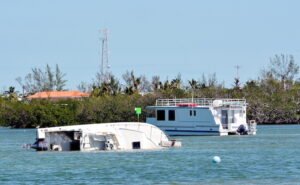
Boating is a popular activity in Nevada’s Lake Mead, Lake Tahoe, and the Colorado River. Though boating accidents – and boating-related crimes – are common. Here are three Nevada boating laws you should know.
1. You have a duty to render aid and exchange information
Following a boating accident in Nevada where you are the operator of a personal watercraft, you have the duty to:
- render aid to anyone who has been injured and needs medical treatment (if practicable); and
- give your name, address, and identification of your boat to anyone who has been injured or whose property was damaged.1
Similar to a car accident, failure to render aid and/or exchange information after a Nevada boat accident is a misdemeanor, carrying:
- up to 6 months in jail and/or
- up to $1,000 in fines2
2. You may have to report the accident
If you are the boat operator and get into an accident, you must file an accident report with the Nevada Department of Wildlife (NDOW) when
- the accident results in a death or physical injury; and/or
- the accident causes more than $2,000 in property damage.3
The report to NDOW must be made within 48 hours if there was a physical injury. Otherwise, you have 10 days to make a report.3
The accident report must include a full description of what happened. Boaters who fail to file a boating accident report face a misdemeanor, carrying:
- up to 6 months in jail and/or
- up to $1,000 in fines4
Contact a boat accident lawyer for help with composing the accident report so that you do not inadvertently admit guilt.
3. You may face criminal penalties for the accident
Depending on the circumstances of the boating accident, you may face Nevada criminal charges for one or more of the following crimes:
Failure to maintain a lookout
Causing injury to another person or causing property damage to a vessel by failing to maintain a proper lookout is a misdemeanor, carrying:
- up to 6 months in jail and/or
- up to $1,000 in fines5
Speeding
It is a misdemeanor to speed more than 5 nautical miles per hour within:
- 100 feet of any person who is bathing, wading, diving, floating or swimming; or
- 200 feet of any:
- beach frequented by persons who engage in the acts of bathing, wading, diving, floating or swimming; or
- swimming float, diving platform or lifeline; or
- way or landing float to which vessels are made fast or which is used for the embarkation or discharge of passengers.
Penalties for violating the boating regulations for speeding include:
- up to 6 months in jail and/or
- up to $1,000 in fines6
Operating the boat in unsafe conditions
It is illegal to operate a boat if it either:
- is overloaded beyond the manufacturer’s recommended safe loading capacity;
- has an insufficient number of personal flotation devices (like “life jackets”) approved by the United States Coast Guard;
- has no fire extinguisher as required by NRS 488.193;
- fails to display the proper navigational lights between sunset and sunrise;
- is leaking fuel or has fuel in the bilges;
- is improperly ventilated;
- has an improper device for controlling backfire flame; or
- is being operated in extremely adverse conditions, such as poor weather conditions.
If you refuse to take immediate steps to correct the condition – or fail to comply with the directions of the peace officer – you face the following sentence for not practicing boat safety:
- A misdemeanor if no injury results, carrying up to 6 months in jail and/or $1,000.
- A gross misdemeanor if bodily injury or property damage in excess of $200 results, carrying up to 364 days in jail and/or up to $2,000.
- A category D felony if death results, carrying 1 to 4 years in Nevada State Prison and up to $5,000.7
Before going out on the water, you are strongly advised to take a boating education course.
Boating under the influence (BUI)
It is illegal to operate a watercraft while:
- under the influence of alcohol or
- with a blood alcohol content (BAC) of .08% or higher (even if you are not impaired)
Boating under the influence is typically a misdemeanor carrying:
- up to 6 months in jail and/or
- up to $1,000 in fines8
Though BUI causing death or substantial bodily harm is category B felony carrying:
- 2 to 20 years in prison and
- $2,000 to $5,0009
Note that BUI laws pertain to all types of boats, from motorboats with low horsepower to giant yachts.

Boating accidents can cause catastrophic injuries, including spinal and brain injuries.
Bringing a boating accident lawsuit
If you are injured in a boating accident in Nevada, you may have grounds to sue:
- the boat driver and/or crew, if they were intoxicated or otherwise negligent;
- the owner of the lake or river (usually the government), if it was negligent in keeping the premises safe;
- the boat manufacturer, if the boat malfunctioned or was defective; and
- the company that maintained or stored the boat, if it was negligent in the upkeep.
Your attorney would fight for enough money to reimburse you for your:
- medical bills,
- property repair bills (such as to your boat, dock, etc.),
- lost wages,
- lost earning capacity, and
- pain and suffering.
If your family member was killed, you could pursue funeral expenses and loss of support through a wrongful death claim.
The majority of personal injury cases resolve out of court with a payout from the defendants’ insurance companies. Though if your case goes to trial, your attorney can also ask the court for punitive damages. This is meant to punish the defendant for their shocking or malicious behavior.
See our article on Lake Mead boating accidents.
Legal References
- NRS 488.550 (“1. The operator of a vessel involved in a collision, accident or other casualty shall, so far as the operator can do so without serious danger to his or her own vessel, crew and passengers, render to other persons affected by the casualty such assistance as may be practicable and as may be necessary to save them from or minimize any danger caused by the casualty, and shall give his or her name, address and the identification of his or her vessel in writing to any person injured and to the owner of any property damaged in the casualty.”).
- NRS 488.950.
- NRS 488.550 (“2. In the case of collision, accident or other casualty involving a vessel, the operator thereof, if the casualty results in death or injury to a person or damage to property in excess of $2,000, shall file with the Department a full description of the casualty, including, without limitation, such information as the Commission may, by regulation, require.”). NDOW’s Handbook of Nevada’s Boating Laws.
- See note 2.
- NRS 488.540.
- NRS 488.600.
- NRS 488.630.
- NRS 488.410. See also People v. Arter, (2017) 19 Cal. App. 5th Supp. 1. See also People v. Gutierrez (2019) 33 Cal. App. 5th Supp. 11.
- NRS 488.420.


